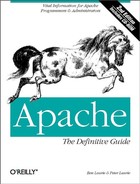15.1. Overview
Perhaps the most important part of an Apache module is the module structure. This is defined in http_config.h, so all modules should start (apart from copyright notices, etc.) with the following lines:
#include "httpd.h" #include "http_config.h"
Note that httpd.h is required for all Apache source code.
What is the module structure for? Simple: It provides the glue between the Apache core and the module's code. It contains pointers (to functions, lists, and so on) that are used by components of the core at the correct moments. The core knows about the various module structures because they are listed in modules.c, which is generated by the Configure script from the Configuration file.[†]
[†] Which means, of course, that one should not edit modules.c by hand. Rather, the Configuration file should be edited; see Chapter 1.
Traditionally, each module ends with its module structure. Here is a particularly trivial example, from mod_asis.c:
module asis_module = {
STANDARD_MODULE_STUFF,
NULL, /* initializer */
NULL, /* create per-directory config structure */
NULL, /* merge per-directory config structures */
NULL, /* create per-server config structure */
NULL, /* merge per-server config structures */
NULL, /* command table */
asis_handlers, /* handlers */
NULL, /* translate_handler */
NULL, /* check_user_id */
NULL, /* check auth */
NULL, /* check access */
NULL, /* type_checker */
NULL, /* prerun fixups */
NULL /* logger */
NULL, /* header parser */
NULL, /* child_init */
NULL, /* child_exit */
NULL /* post read request */
};The first entry, STANDARD_MODULE_STUFF, must appear in all module structures. It initializes some structure elements that the core uses to manage modules. Currently, these are the API version number,[‡] the index of the module in various vectors, the name of the module (actually its filename), and a pointer to the next module structure in a linked list of all modules.[§]
[‡] Used, in theory, to adapt to old precompiled modules that used an earlier version of the API. We say "in theory" because it is not used this way in practice.
[§] The head of this list is top_module. This is occasionally useful to know. The list is actually set up at runtime.
The only other entry is for handlers. We will look at this in more detail further on. Suffice it to say, for now, that this entry points to a list of strings and functions that define the relationship between MIME or handler types and the functions that handle them. All the other entries are defined to NULL, which simply means that the module does not use those particular hooks.
